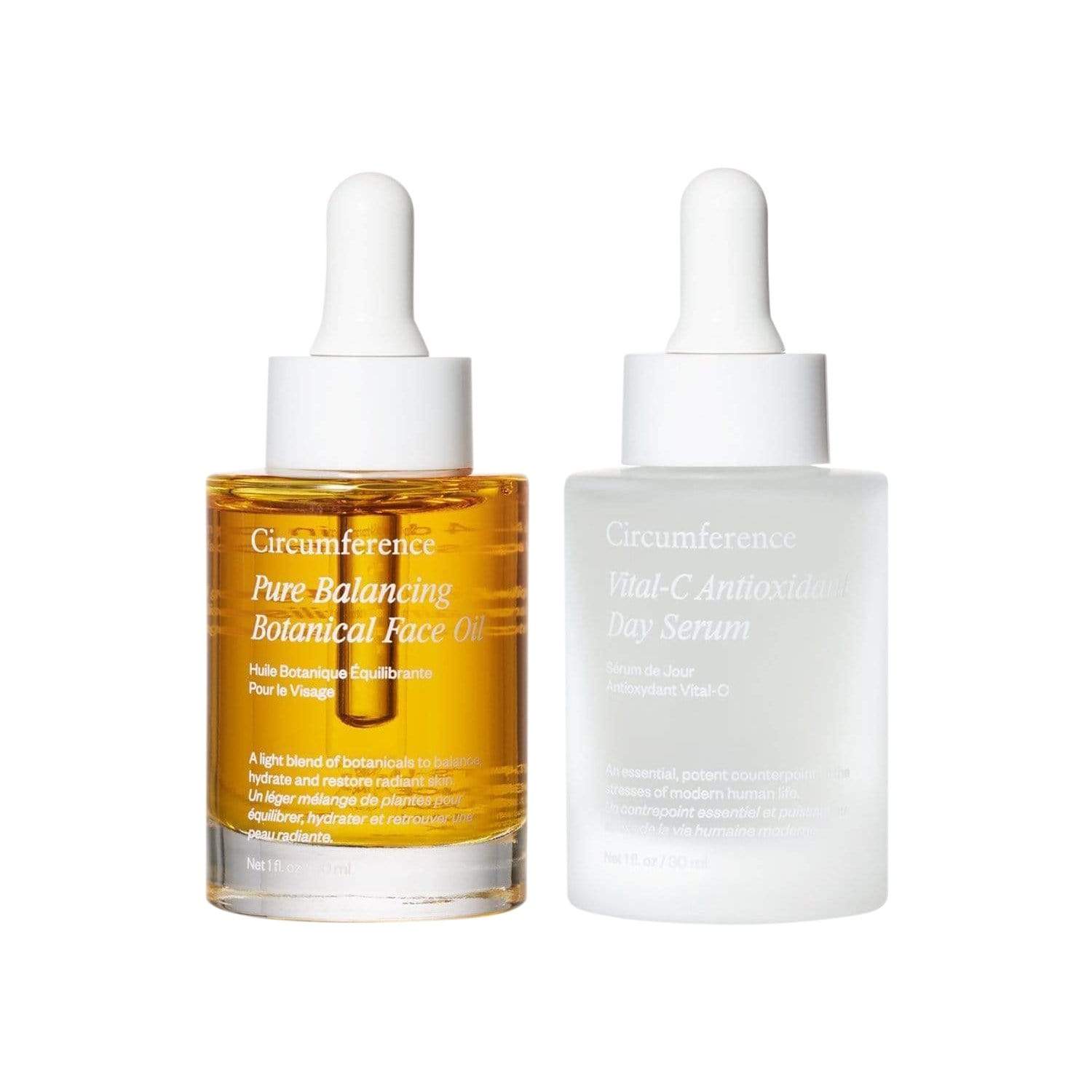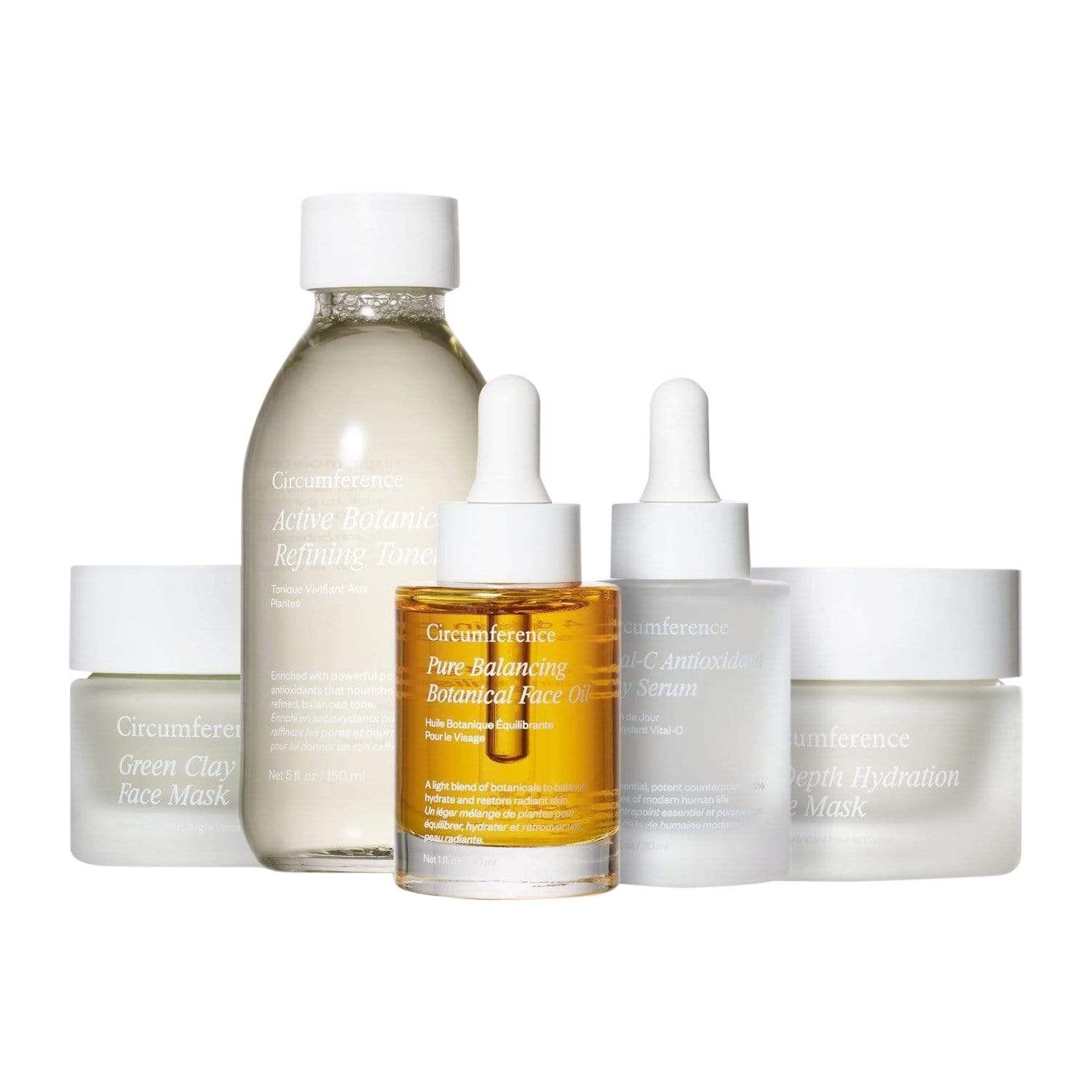We as consumers are more motivated than ever to make conscientious decisions about where and what our dollars go towards when we shop, maybe especially so when it comes to skincare. Questions like how effective is this product, does it work on dry/oily/acne-prone/sensitive skin, and what are the ingredients weigh on our mind and are layered on top of questions like are the ingredients toxic, is the product fairly produced, is the packaging sustainable. No one brand gets it right 100% but brands like Circumference NYC are goal-driven to get as close as possible.
Founded by husband-and-wife team Chris Young and Jina Kim, Circumference is a minimalist skincare brand that ticks off your skincare non-negotiables: high-efficacy formulas; nontoxic, high-quality ingredients; and state-of-the-art extractions and testing methods. However, as motivated as Chris and Jina are to take care of our skin, they’re just as driven to take care of the planet while doing so. Their sustainability model already includes a number of initiatives, like fair and socially responsible practices with their independent producers/suppliers/farmers, as well as alternative plastic-free packaging. They’ve now launched a new initiative, Waste-Not Sourcing, a beauty-industry first, according to their standards. While Circumference was already conscientiously sourcing its botanicals by getting them from indigenous regions where the plants are healthfully grown, it’s now engaging in cross-industry collaborations with independent agricultural producers to turn by-product waste materials into luxe, potent ingredients in their formulations.
Curious as to how? We’ll let co-founder and COO of Circumference, Chris, give you some background to explain:

From The Shop

Essential Serum Set
Where did the name Circumference come from?
Our thesis for this brand since inception revolved around the idea of developing and implementing new and innovative sustainable practices in the beauty industry. The mission for us has always been to best understand where we can improve the practices that negatively impact not only our environment but social and economic balance.
Naturally, a circular approach to skincare came to mind intuitively. So from there the name naturally kind of found itself—Circumference—the enclosing boundary of a circle.
Why is sustainability such an important pillar of the Circumference brand?
Prior to Circumference, I was part of a small team that launched an amazing sustainable women’s wear line. It was a truly eye opening experience in seeing what was possible and then even moreso to see such a positive reception from consumers.. They were just ready for it and as someone who’s always been passionate about skincare, it made me think, how could I apply to the beauty industry?
The world needs better, more accessible alternatives more than ever. There’s very little reason for just another brand to exist, unless that brand exists to help fix the wrongs that pollute this industry and the world.
We’re not just interested in presenting recyclable packaging and calling it sustainable. We’re interested in developing new practices that can set a new precedent for what sustainability can be in the beauty industry. That’s equally as important to us as—and closely tied to—the quality and efficacy of our skincare products.
What is the Waste-Not Sourcing Initiative?
We launched our Waste-Not Sourcing Initiative in October of 2020, alongside our Active Restorative Moisturizing Cream. The Initiative is an industry-first in terms of its sourcing strategy and unprecedented level of transparency. It will be underlying in all product launches we do from here on out.
The initiative aims to identify bio-waste and byproduct materials from agriculture-driven industries and repurpose them as highly valuable skincare ingredients.
In the first phase of the initiative, we partnered with a winery here in NY state, Bedell Cellars. Their focus is in cultivating and harvesting quality grape fruits for their winemaking. However, much of the leaves and vines unfortunately goto waste or composted.
That’s where we go in and harvest the leaves and extract for actives for skincare purpose. Grape leaves hold a lot of powerful nutrients such as antioxidants, polyphenols and enzymes—all incredible for your skin. So we harvest the leaves and once extracted, we return the post-extraction mulch back to the vineyard to be used as compost for next season.

From The Shop

Essential Detox Set
Buzzwords found in beauty marketing and advertising like “sustainably made,” “clean beauty,” and “natural ingredients” are unregulated, so it falls on the brands to be truthful about their products and practices, and the consumers to be mindful of it. What kinds of questions do you think consumers should be asking of all brands – beauty-related and otherwise?
The food industry is really taking the lead in empowering consumers. They’re already equipping consumers with incredibly valuable knowledge such as where ingredients are sourced and how they’re cultivated, harvested, prepped and ultimately plated before they’re served.
So far, there seems to be a disconnect in our industry in understanding that we can and should be asking those same questions in beauty. Where are these so-called “natural” and “organic” ingredients coming from? How are they cultivated and processed and ultimately formulated? And even deeper, who are the humans behind the ingredients and how is their livelihood being affected, both negatively and positively?
Products and brands are deemed “clean” based on a simple ingredient list but that’s ultimately ignoring the real question which happens behind the curtains. Is it really clean just because it’s plant based when fellow humans are being harmed in producing it? Or is it really clean when harmful solvents were used to extract the plants? The ingredient list doesn’t tell the whole story unfortunately.
How can other beauty brands be and do better – for their products, for their consumers, for the planet?
Far too many brands simply put the onus on the consumers to carry on the act. For example, recyclable packaging, while important, is only as sustainable as the consumers make it. The responsibility ultimately lands in the hands of the consumer to dispose of the waste responsibly.
Truth is, not every brand can or should be “sustainable”. But it does more harm than good to make false claims of sustainable, clean, natural, etc without really putting the work in. Brands can do better by not using it just as a marketing term, but really finding ingenious ways within their own practices and supply chain—be sustainable before the product even lands in the consumers’ hands.
What is Circumference working on next?
We’re currently continuing to expand on our Waste-Not Sourcing Initiative. We’re continually testing and formulating with the Vitis Vinifera (Grape Leaf) Extract that we sourced in partnership with Bedell Cellars, but also working identify other bio-waste/byproduct materials we can utilize and add to our roster.
Beyond that, the job is never done! We’re constantly dreaming up and developing new methods to produce highly effective, sustainable skincare products and really look to our consumers to tell us what they want to see next.
>>> We can’t help but admire and applaud Circumference’s mission to beautify the future — for our skin and the planet. You can now shop Circumference’s full skincare line in the Design Milk Shop. <<<

From The Shop

Essential Hydration Set

Essential Mask Set
We donate 1% of the Design Milk Shop sales to charities or entities that promote social justice and reform or provide relief. Read the Design Milk Mission for our commitment to donations, diversity, equity + anti-racism action.
from WordPress https://connorrenwickblog.wordpress.com/2020/10/16/circumference-turns-by-products-of-winemaking-into-luxe-skincare/














No comments:
Post a Comment